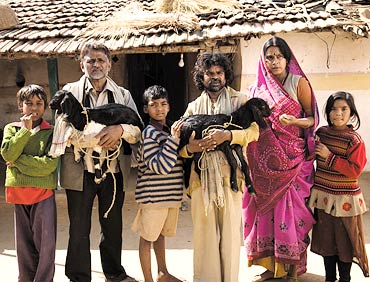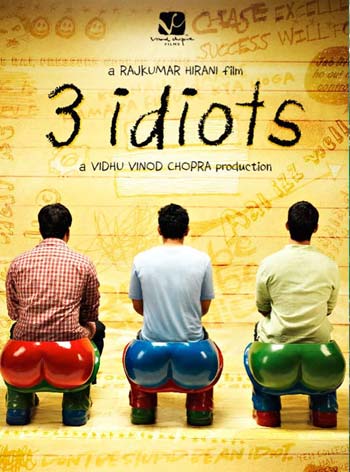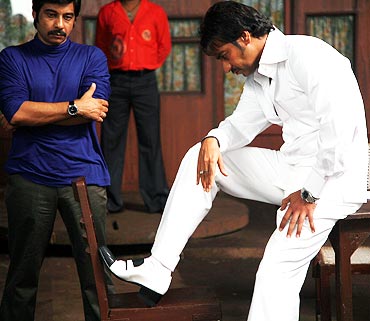 | « Back to article | Print this article |
Here's how even flop films make tons of money now!
Forty years ago, the box office debacle of Mera Naam Joker nearly drove Raj Kapoor to sell off R K Studios to clear his debts.
Had Kapoor made the film today, he could have sold off the film's rights -- the rights for satellite television screenings, for home video, pay-per-view, overseas distribution and so on -- even before he'd made the film, so the film's box-office failure wouldn't have mattered.
Pre-selling, as it's called, is what's bringing in the moolah for producers these days. "With production costs going through the roof, it is only logical that producers want to book their profits prior to a film's release," says Kunal Kohli, director of films like Hum Tum and Fanaa.
It hasn't helped that few films have done well at the box office in the past year -- as per industry reports, the industry shrunk from Rs 10,400 crore (Rs 104 billion) in 2008 to Rs 8,900 crore (Rs 89 billion) in 2009.
To be sure, pre-selling is not a new phenomenon. Producers, especially the corporatised ones, have been doing it for at least a couple of years now. But what's new is the huge sums exchanging hands and the alacrity with which pre-selling deals are being pursued.
Click NEXT to read on . . .
Here's how even flop films make tons of money now!
Number story
For instance, I Hate Luv Storys which was made on a budget of about Rs 17 crore (Rs 170 million), pocketed Rs 12 crore (Rs 120 million) from satellite rights alone, even before audiences had declared it a 'hit'.
Farah Khan's Tees Maar Khan, which will release next September-October, is in talks to sell its satellite rights for Rs 18 crore (Rs 180 million). Producers of upcoming movies like No One Killed Jessica and Peepli Live (budgets around Rs 5-10 crore or Rs 50-100 million), too, report having sold their TV rights, recovering almost their entire production cost.
What explains this rash of high-value deals? It's partly the multiplex strike of 2009, which set back the release dates for a number of films.
"A number of producers were banking on post-release revenues to fund under-production films. However, this cash flow was delayed on account of the strike, forcing producers to aggressively market ancillary rights," points out Jehil Thakkar, media and entertainment analyst at KPMG.
Partly, it was the success of 3 Idiots that convinced the industry that pre-selling was the way to go. Of course, 3 Idiots was not pre-sold -- its producer Vidhu Vinod Chopra sold the satellite rights to Sony Entertainment Television (SET) for five years for around Rs 38 crore (Rs 380 million) after the film had earned an unprecedented Rs 400 crore (Rs 4 billion) and more at the box-office.
Click NEXT to read on . . .
Here's how even flop films make tons of money now!
It was win-win for SET too, because the film, which premiered on July 25, drew an unprecedented 16.8 million viewers to the channel, as per TAM data.
SET claims that it has already recovered 40 per cent of its cost of acquisition; it now plans to earn some more with a second screening in August.
For television channels, of course, films make great sense, especially now that advertisers, hit by the global financial downturn, have become more than usually conservative with their media spends.
"A film ensures higher GRPs (gross rating points), which draws advertisers. Hence there is a fight to get the best film content on board -- by paying any price -- and then hoping to collect the investment over re-runs," says an executive with a leading GEC.
Flop no bar
The fact is, even films that haven't done well at the box office have worked for channels. Take Raavan, which debuted some days ago on Colours, and managed an above average rating of 2 (according to ratings agency aMap).
Click NEXT to read on . . .
Here's how even flop films make tons of money now!
Even Kites, a box-office disaster, managed a 2.5 rating when it premiered in June on Colors. (To put the number in context, 3 Idiots had a rating of 5.) According to media planners, Colors priced 10-second advertisement spots at Rs 1.5 lakh (Rs 150,000) for Raavan.
"The film would have generated ad revenues of around Rs 4 crore (Rs 40 million) in the first screening and should fetch more in subsequent ones," says a media buyer who bought spots in the film.
No wonder broadcasters are chasing producers -- who are only too happy to strike deals.
For UTV Motion Pictures for instance, pre-selling has become part of a strategy to de-risk the business -- either by way of exclusive deals where the satellite and repeat telecast rights for a film are sold to one channel for a fixed number of years; or bulk deals where the rights for a number of under-production films are leased out to one or many channels.
"The payouts are usually better in exclusive deals as the broadcaster is ready to pay a premium to the producer, based on his feeling that the film will be of a certain quality," says Siddarth Roy Kapur, CEO, UTV Motion Pictures.
Click NEXT to read on . . .
Here's how even flop films make tons of money now!
It's a strategy that is paying dividends for the company. It clocked revenues of Rs 110.8 crore (Rs 1.108 million) in the first quarter this year, up from Rs 26.5 crore (Rs 265 million) in the same quarter last year.
This was on the back of a series of lucrative syndication deals with Colors and NDTV Imagine (now Imagine) for its 2008 and 2009 productions -- Oye Lucky! Lucky Oye!, Wake Up Sid and Kurbaan -- amounting to nearly Rs 100 crore (Rs 1 billion).
Exclusive deals work out better for broadcasters too. Sameer Rao, senior vice-president (strategic planning and commercial), Star TV, realised this sometime late last year, which is when the channel stepped up its campaign to acquire the rights of under-production films.
The channel bet its money on nine films, which included My Name Is Khan, Housefull, I Hate Luv Storys, Tere Bin Laden and Raajneeti. With MNIK's television debut early this year -- which the network reportedly picked up for around Rs 15 crore (Rs 150 million) -- Rao claims Star Plus has added 1.5 million new viewers.
"It is a fresh mix of audience for our advertisers and helps us to improve GRPs by up to 20-25 points," he says.
Click NEXT to read on . . .
Here's how even flop films make tons of money now!
Rao now wants to buy more films before they hit the theatres, including Aamir Khan's Peepli Live if he can. "We are cherry-picking titles in advance so that we can plan our media sales in a structured manner. We can approach the advertisers with content that blends with their brands. It's a win-win situation for both."
It's not just broadcasters and producers, but distributors too who are on a pre-selling spree. Eros India signed deals in June to premier the Shahid Kapoor-starrer Paathshala and Farhan Akhtar's Karthik Calling Karthik, as also forthcoming films such as Anjaana Anjaanee, Rockstar and Toonpoor Ka Superhero, on the Star network.
"Striking a deal in advance means that we can work together with Star to promote the films on their network as a build-up to the theatrical release of the films," Eros CEO Jyoti Deshpande said in an official statement.
Content is king
Kamal Gianchandani, president, PVR Pictures subscribes to the sentiment that movies will continue to be pre-sold in 2010, irrespective of their budgets or star cast.
"It is the content that commands value today," he reasons. With business in multiplexes being restricted to just about two weeks, the hold-back period (film trade jargon for the duration a producer holds the rights to the film) is fast shrinking.
As per KPMG estimates, at least 77 per cent of a film's revenues still come from theatrical rights, followed by satellite and overseas rights at 7 per cent each, home video at 5 per cent and other revenue streams at 4 per cent.
Of course, this ratio varies according to the budget and box office receipts of a film -- for 3 Idiots, satellite rights constitute about 8.5 per cent of its takings, while for a small film like Tere Bin Laden, made on a paltry budget of Rs 8.5 crore (Rs 85 million), the Rs 4.25 crore (Rs 42.5 million) it got from the sale of its satellite, overseas and music rights, works out to as much as 50 per cent.
Money talks
"Over time, as monetisation from other sources improves, a film's dependence on theatrical revenues is expected to go down," predicts Thakkar of KPMG.
Click NEXT to read on . . .
Here's how even flop films make tons of money now!
Already, says Kapur of UTV, the market for satellite and other rights has seen a steady growth over last year.
"Channels are eager to buy film content as last year they didn't pick up many titles," he adds.
But not everything is hunky-dory for producers. Mudassar Aziz, who directed the Sushmita Sen-starrer Dulha Mil Gaya (2009), argues that it is largely 'corporate-like' studios that adopt the newer business models. Aziz, whose film didn't do very well at the box office, insists no TV channel broadcaster will bet on a first-time director or a debutant cast even if the content is worthy.
Also there is the risk -- for the broadcasters and the producers.
"Had the channel bought the rights of Kites after its release, I don't think the producers would've got the price they did,'' says one director.
It works the other way, too -- "Ekta Kapoor sold the rights of Once Upon A Time in Mumbaai along with Love Sex Aur Dhokha," says film trade analyst Komal Nahata.
"Had she waited until the film's release, she would have got far more, going by the great response the film has got."
In the film trade, of course, risk is a way of life.







